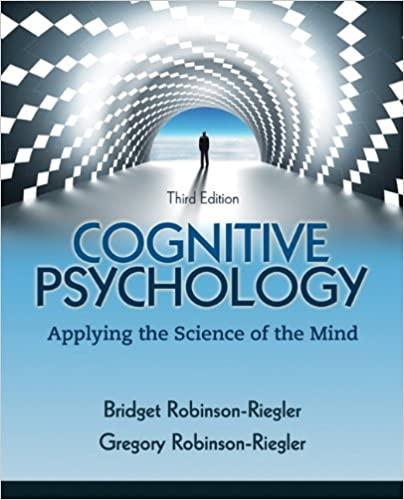Question
CASE HISTORY Jane is a 19 year-old, Asian-American college student who is attending the University of California, Berkeley. She is currently in her second semester
CASE HISTORY
Jane is a 19 year-old, Asian-American college student who is attending the University of California, Berkeley. She is currently in her second semester and is a political science major. She wants to go on to law school like her father.Jane has a self-reported history of intense anxiety at the prospect of speaking in class.
Jane went to private schools in Berkeley for elementary, middle and high school. She reports feeling uncomfortable when she was younger speaking in front of the class, but admits it has gotten much worse. She remembers in middle school her mother picking her up early on days she had to present a book report to the class, telling the office she had a dentist appointment. When Jane got to high school she began to use marijuana to ease the anxiety. Jane says it helped her to speak in front of the class, but admits not being able to focus as clearly on her assignments causing her grades to slip.
Both of Jane's parents are professionals. Her father is an attorney with a successful practice and her mother is an English professor. Her father came to the U.S. from China when he was a young boy. He met Jane's mother in college. She is an only child. There is no history of psychological illness on either side. In fact, Jane states quite the opposite. She says her family is a "bunch of over achievers". Jane's father quickly put a stop to her mother picking her up from school when these anxiety attacks would occur. Both parents did not condone the use of marijuana and out of respect for them Jane gave it up. A couple of night's a week she does enjoy having a couple of beers in her dorm room, but states her parents would disapprove of this as well, particularly since she is under age.
Jane deals with the fear now by taking only crowded lecture courses and seating herself at the rear of the room where she hides herself as completely as possible. If she arrives late and cannot get a seat in the back, she doesn't go to class.
Jane is in good physical health, maintains a normal weight and eats properly. She states this is because even though she lives at the dorm, her parents request that she eat dinner at home with them no less than four times per week. She does admit that days when she is feeling particularly anxious she does not have much of an appetite. This is difficult on family night, when her parents become frustrated with her for not eating the dinner they have prepared. When she is on her own there have been days when she eats nothing at all, even though she does have a food voucher for the cafeteria at school. Jane would like to exercise more, but the thought of a crowded gym makes her uncomfortable. She did try a 30- day trial membership at a local gym a couple of months ago, but felt so dizzy and nauseas when she entered the lobby, decided to return to her dorm room.
Jane does not work. In fact, she has never held a job. Her father feels that her job is her school work and would like Jane to be working in the family law firm as soon as she passes the bar. Jane has shown a desire to work at the firm during breaks, and her father says he will consider it for the summer.
Jane does not have many friends. The few friends she had in high school have gone off to college, or spend their time with their boyfriends. Jane reports having a few dates in high school, but can't really meet anyone at college.
Last week in class when the teacher began to call on students at random Jane experienced intense anxiety accompanied by sweating and trembling.She had to exit the room and return to her dorm. Away from the situation it took Jane a few hours to calm herself again.When Jane did not come out of her dorm room for so long, a classmate alerted the dorm resident who referred Jane to campus mental health.
What is the prevalence of Janes's disorder?
Discuss etiology of Jane's disorder using the multipath model, you can choose more than one dimension
What assessment tools would be helpful in diagnosing Jane's disorder?
What research has been done on effective treatments of Jane's disorder?
Step by Step Solution
There are 3 Steps involved in it
Step: 1

Get Instant Access to Expert-Tailored Solutions
See step-by-step solutions with expert insights and AI powered tools for academic success
Step: 2

Step: 3

Ace Your Homework with AI
Get the answers you need in no time with our AI-driven, step-by-step assistance
Get Started


